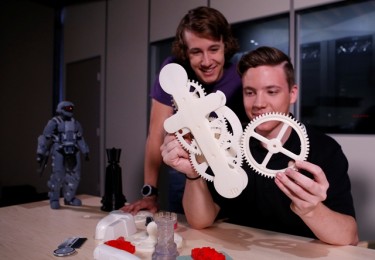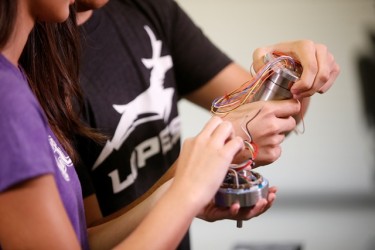Story by Michael Ferraresi
Photos by Darryl Webb
GCU News Bureau
Students seeking careers as biomedical, electrical and mechanical engineers can begin preparing for their dream jobs at Grand Canyon University in fall 2015.
Combined with recently announced programs in electrical engineering, computer science and information technology, the new biomedical and mechanical engineering degrees being rolled out next year are part of GCU’s College of Science, Engineering and Technology’s enhanced STEM offerings. The new degrees are designed to cultivate young people for challenging jobs rooted in the study of science, technology, engineering and math.
The biomedical and mechanical engineering programs recently were approved by the Arizona State Board for Private Postsecondary Education, as the electrical engineering program was earlier this year.
GCU’s first ever students in each of the three engineering concentrations will begin classes in August, though their first classroom lab experiments and capstone projects will come together as the programs evolve over the next few years. Moreover, a goal of the engineering programs — like those in CS/IT — is to introduce students to hands-on, real-world problems and projects throughout their undergraduate studies.
The engineering programs will have a predominant presence at the new academic buildings on Camelback Road near Ethington Theatre. The first of two 80,000-square-foot buildings is under construction and will include new physics, microbiology and chemistry lab space for engineering students and other science programs. The second phase will be dedicated more specifically to the engineering programs, with labs for class assignments and collaboration. A 60,000-square-foot general classroom building also is scheduled to be built in that same area.
University Provost Dr. Hank Radda and others said the new engineering labs will include space for students to experiment with complex course materials related to everything from thermodynamics to electronics. Radda added that GCU's new labs will provide a forum for collaboration with partners at local engineering firms.
“It’s going to be exciting,” Radda said. “We might not be able to envision some of the possibilities that could develop from our students, faculty and industry partners. For example, our industry partners might present a problem that our students and faculty could work on solving. But those engineering labs will provide a hub for a wide range of technological collaboration.”
Industry leaders provided guidance
GCU planners visited with leaders from large local engineering companies, midsize companies and consulting firms to glean industry feedback as part of program development. The University followed a similar process with industry stakeholders to prepare the computer science and information technology degrees before their fall 2014 rollout to ensure that real-world needs would be addressed in the classroom.
Radda said establishing the computer science and information technology degrees was crucial to setting the academic foundation for engineering programs, disciplines that rely on strong critical thinking and computer skills.
“What drives that is the real need in the business community in Arizona to increase local STEM jobs,” Radda said. “There’s already a workforce need in those areas. The fact that GCU could bring together experts, build the infrastructure and hire the faculty for our new technology and engineering programs in less than two years emphasizes our commitment to developing students to serve in these critical roles in the community in the future.”
Dr. Michael Sheller, hired this summer to oversee the University’s engineering programs as an associate dean for the College of Science, Engineering and Technology, said local engineering industry leaders overwhelmingly encouraged GCU faculty to introduce students to computer-aided design trends and real-world project development, perhaps sooner than some universities might.
With mechanical and biomedical curriculum in particular, Sheller drew from his own industry experience, from working as a bioengineer and executive at a Tempe biomedical firm for several years before starting his own business to consult for biomedical engineering companies.
He added that GCU is combining engineering classroom lectures and labs in most cases to ensure that students can collaborate on lab work with the same classmates and instructors.
“The idea is the instructor introduces a concept before they conduct an experiment and collect data, then they move on to the next topic,” Sheller said. “We want to enhance the learning experience by combining the two (lectures and labs).”
Like most students, GCU engineering students will address prerequisite coursework in their freshman year, though students in each of the three concentrations begin taking engineering or science courses immediately. By their sophomore years, they will be primarily focused on core coursework in physics, applied mathematics and engineering labs in preparation for more complex work in their junior and senior years.
Programs emphasize hands-on experience
Students in each of the three engineering emphases will be exposed to business applications and entrepreneurship in their industries, but here are some key features with each of the bachelor’s degrees in engineering:
● Biomedical engineering: Students will learn how to design medical devices and how to address patient care through technology for therapeutic, diagnostic and lab experiment uses. Lecture/labs on Transport Phenomenon (the study of fluid mechanics, heat transfer and mass transfer), Biomaterials, Dynamic Systems and Biomedical Instrumentation are included in their junior and senior years. Since medical devices are so precisely regulated, students also will study those regulatory guidelines, Sheller said, to put them “in the position to be the driver of a project early on” in their careers.
● Electrical engineering: A highlight for tech-oriented students is the Control Systems and Robotics lecture/lab course scheduled for seniors, which enables students to experiment with the design and control of a robot. Another senior year lecture/lab, Power and Energy Systems, will provide opportunity for experiments on the use and application of energy for engineering projects. Sheller added that he’s looking forward to some of the cellular phone technology experiments students will be able to conduct in Communications Signal Processing, which addresses a range of material from analog functions to complex wireless and mobile network delivery.
● Mechanical engineering: Students will be exposed to industry best practices on mechanical design, manufacturing techniques and computer-aided design trends. They also will have an opportunity to take the Control Systems and Robotics lecture/lab. But the focus is largely on systems engineering, and labs enable students to learn how to identify and examine heat transfer and stresses and strains in projects.
GCU also plans to introduce engineering students to meaningful general education courses such as Christian World View, Effective Communication and others to ensure they develop the soft skills and general professionalism many employers require of new hires.
“The engineering programs have been designed so that in each semester there is at least one non-engineering course,” Sheller said. “Our programs are still going to be rigorous, but students will have a chance to get a little break and exercise other parts of their brain. I’d argue that they’ll be able to do a better job in their core classes in this structure.”
In addition to the new undergraduate degree programs, GCU also recently announced its “STEM Scholars” partnership with Peoria Unified School District to provide local students the opportunity to complete their first year of college, tuition-free, during high school. The University plans to expand STEM Scholars to 650 students across 10 local school districts over the next two years, further driving the development of capable science and tech thinkers.
Radda added that the CS/IT and engineering programs, in addition to others, address GCU President and CEO Brian Mueller’s plan to have 70 percent of ground campus students studying in programs related to science, technology, engineering and mathematics by 2020.
Contact Michael Ferraresi at [email protected] or 602-639-7030.











































































